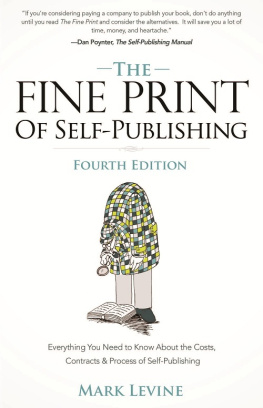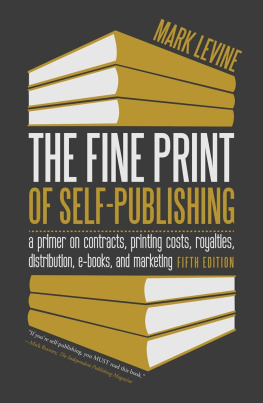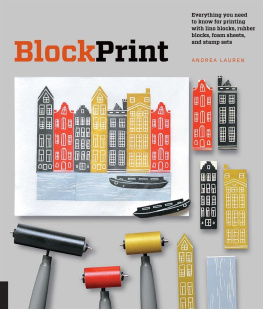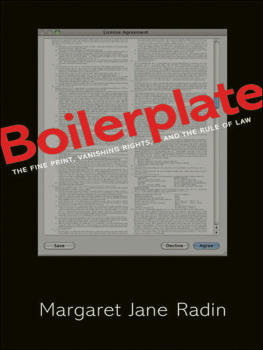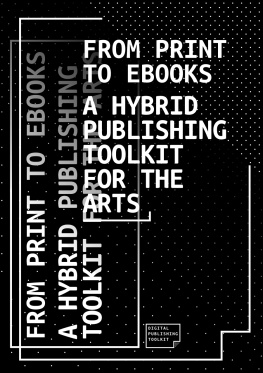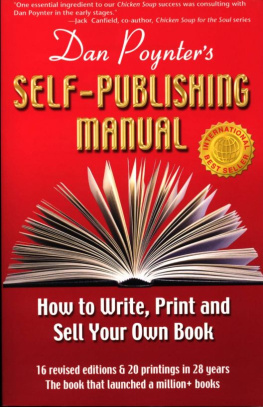Mark Levine - The Fine Print of Self-Publishing
Here you can read online Mark Levine - The Fine Print of Self-Publishing full text of the book (entire story) in english for free. Download pdf and epub, get meaning, cover and reviews about this ebook. year: 2011, publisher: Bascom Hill Publishing Group, genre: Business. Description of the work, (preface) as well as reviews are available. Best literature library LitArk.com created for fans of good reading and offers a wide selection of genres:
Romance novel
Science fiction
Adventure
Detective
Science
History
Home and family
Prose
Art
Politics
Computer
Non-fiction
Religion
Business
Children
Humor
Choose a favorite category and find really read worthwhile books. Enjoy immersion in the world of imagination, feel the emotions of the characters or learn something new for yourself, make an fascinating discovery.
- Book:The Fine Print of Self-Publishing
- Author:
- Publisher:Bascom Hill Publishing Group
- Genre:
- Year:2011
- Rating:4 / 5
- Favourites:Add to favourites
- Your mark:
- 80
- 1
- 2
- 3
- 4
- 5
The Fine Print of Self-Publishing: summary, description and annotation
We offer to read an annotation, description, summary or preface (depends on what the author of the book "The Fine Print of Self-Publishing" wrote himself). If you haven't found the necessary information about the book — write in the comments, we will try to find it.
The Fine Print of Self-Publishing (Fourth Edition) offers a comprehensive guide to the self-publishing world, and is a must-read for any author considering self-publishing his or her book.
The Fine Print of Self-Publishing — read online for free the complete book (whole text) full work
Below is the text of the book, divided by pages. System saving the place of the last page read, allows you to conveniently read the book "The Fine Print of Self-Publishing" online for free, without having to search again every time where you left off. Put a bookmark, and you can go to the page where you finished reading at any time.
Font size:
Interval:
Bookmark:
Copyright 2011 by Mark Levine
Bascom Hill Publishing Group
212 3 Ave North, Suite 290
Minneapolis, MN 55401
612.455.2293
All rights reserved. No part of this publication may be reproduced, stored in a retrieval system, or transmitted, in any form or by any means, electronic, mechanical, photocopying, recording, or otherwise, without the written prior permission of the author.
ISBN: 978-1-935098-74-4
This book is dedicated to all the authors who know there is a book inside of them. One of the most amazing publishing experiences is holding a printed and bound copy of your own book for the first time. I hope The Fine Print helps you find the right publisher for your book.
The publishing world, as you probably know, is changing so rapidly it's hard to keep up. Amazon.com has eclipsed Barnes & Noble as the largest retailer of books in the U.S. Toss in the brewing eBook turf war between Apple, Amazon, and Barnes & Noble, and wowthis industry is changing fast!
There are the headline-grabbing changes, and then there are the ones that affect those trying to get their books published. If you are reading this book, you probably already know that it's harder than ever to get published by a "traditional" publisher. In 2008, there were at least ten thousand fewer traditionally published titles than there were in 2007. This means that more authors are competing for fewer spots on a publisher's roster.
You should be looking at statistics like these as blessings in disguise. They force writers to abandon the notion that nabbing a contract from a traditional publisher is some kind of Holy Grail. For writers "lucky" enough to get such a contract, the reality is that most traditional publishers have small or even nonexistent marketing budgets for books by new authors. Many of these publishers make the expenses of book marketing the responsibility of the author, who gets a miniscule royalty from each sale. In most of these cases, if a title by a new author is successful, it is due to the author's efforts. Guess who makes virtually all of the money in this scenario? The publisher. Guess who spends the most time and money on the book? The author. Yes, there are exceptions to this, but the odds of being the exception are about as good as winning the Powerball.
While it's great to be a dreamer, in book publishing it's smarter to be a realist. In 2004, Nielsen Bookscan tracked the sales of 1,200,000 books through retail locations (including online retailers) in the United States. Of all books sold, 79 percent sold less than ninety-nine copies.
If you're serious about publishing your book, self-publishing (either on your own or through a good self-publishing company) might be your only optionand your best one, even if a traditional publisher were interested. The biggest growth area in book publishing is in self-publishing (and short-run titles, which may or may not be self-published). The number of self-published titles has exploded since 2002, when there were only 32,639.Yes, the marketplace is more crowded than ever before. But the opportunities to distribute and market your book have also expanded like never before.
The Internet has helped to level the playing field. It takes more than having a website and being on Facebook and Twitter to be successful online. There are many facets to successful online book marketing. The conclusion touches on a few of them but, believe me: online book marketing could fill a book by itself. If you want proof that online marketing worksyou're reading it right now. Since the first edition of The Fine Print of Self-Publishing was released in 2004, I've marketed this book exclusively online. I've never purchased an ad in a magazine, on the radio, or on television. The website for this book is search engine optimized (SEO) and ranks high on search engines for terms that I know authors looking to self-publish are using when looking for information over the internet.. I also purchase pay-per-click ads on most major search engines, which help put my book in front of people who are already searching online for information about book publishing. These things really work. Combining smart online marketing with an ebook can bring things to a whole new level. By cutting out the costs of a printed book, the postage fees, and the customer's wait for it to arrive, a nirvanic book experience can be enjoyed (except by those who prefer the smell and feel of a physical book). This isn't to say that printed books are going away. They aren't. But, the advances in ebook reading technology (like Amazon's Kindle, the Sony eReader, B&N's Nook, and Apple's iPad) have made ebooks a very real and viable way for authors to sell and distribute their books. In July 2009, ebook sales rose 213.5 percent from July 2008.
While you still need potential readers to find your book in order to sell it to them in any form, having it available in every format readers want will help. As the e-reading devices move down in price and consumers become more comfortable with curling up with them instead of an actual book, ebook sales will grow even faster. In 2009, between one and two million e-readers were shipped worldwide. If you haven't muttered "wow," go back and read the last few sentences. There is a revolution happening right before our eyes.
So, as the publishing world changes and evolves, authors like you and me have more opportunity than ever before to carve out our slice of the publishing pie without waiting for traditional publishers to open the door for us. What makes The Fine Print unique among books on self-publishing is that I've experienced the industry as an author, a book publisher, and a marketer. I know what it feels like to hold a copy of my own finished book for the first time. I also know what it takes to publish, print, and market that book. In addition to this book (and its three previous versions), I've published two of my own novels. I've made every mistake you can make in publishing and tried just about every type of marketing tool available.
Being a successful author can mean a lot of different things. For some, it's making enough money to write full time or to use the book as part of an ongoing business strategy. For others, it's having a book for your family and friends. For still others, it's the fulfillment of a dream. For me, it was a combination of all of these and has evolved over time. In August 1992, I decided I wanted to write a novel. Although my manuscript was finished by 1995, I had no idea what to do with it. In 1999, I started Click Industries, a company that does online business filings, including copyrights for authors. In putting together strategic partners for the company, I found a small book publisher who accepted my book. Sadly, the publisher went out of business in 2004.
In 2004, I published the first version of The Fine Print. Since almost everyone (well, those who read this book) asked me how I came up with the idea for The Fine Print, I'll tell you. I'm a gut-feel kind of businessman. One day I got a call from an author who had been published by the same publisher that released my first novel. He told me that he had signed a contract with a self-publishing company and wanted to get out of it. He knew that I had been a lawyer and asked if I could help. He sent me the contract. He had signed the contract despite the fact that it contained a clause that gave the self-publishing company the rights to the book for the term of the copyright. The term of a copyright is the life of the author plus seventy years. This author was a professor at the University of California-Berkley. I figured that if a professor from a top university would sign such a ridiculous contract just to be published, there must be thousands of other authors who might do the same thing.
Font size:
Interval:
Bookmark:
Similar books «The Fine Print of Self-Publishing»
Look at similar books to The Fine Print of Self-Publishing. We have selected literature similar in name and meaning in the hope of providing readers with more options to find new, interesting, not yet read works.
Discussion, reviews of the book The Fine Print of Self-Publishing and just readers' own opinions. Leave your comments, write what you think about the work, its meaning or the main characters. Specify what exactly you liked and what you didn't like, and why you think so.

